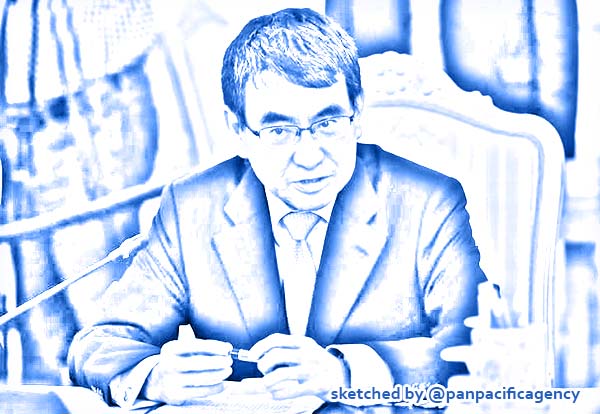Japan’s snap general election is possible in October: Minister

Taro Kono. Photo: REUTERS. Sketched by the Pan Pacific Agency.
TOKYO, Sep 10, 2020, Kyodo. Defense Minister Taro Kono said Wednesday that he is expecting a snap general election, possibly in October, after a successor to outgoing Prime Minister Shinzo Abe is selected next week, The Japan Times reported.
“We expect an early general election, probably sometime in October, or maybe in October,” Kono said during an online event with the Center for Strategic and International Studies, adding that Japan will then be “ready” for the Tokyo Olympics and Paralympics, which were postponed to next summer due to the coronavirus pandemic.
The new Liberal Democratic president is all but certain to become the next prime minister as the party controls the House of Representatives. The winner is entitled to serve the remainder of Abe’s term as party leader through September next year.
But speculation lingers that the next prime minister may quickly call a Lower House election to capitalize on a possible popularity boost that tends to follow a change in leadership. A general election must be held by late October next year, when the current four-year term for Lower House lawmakers ends.
“I think there’s going to be a very small window for a general election. So the new prime minister will probably grab that window, and you will have a new prime minister elected by the people before you elect the president of the United States,” Kono said, referring to the U.S. presidential election in November.
Kono also said during the event hosted by the Washington think tank that China has become a “security threat” to Japan, citing Beijing’s intention to change the status quo in the region through force and coercion, including in the East China Sea, where China continues to contest Japan’s administration of the Senkaku Islands.
Kono said that he was “very careful” not to call China a “threat” while serving in his previous post as foreign minister, and instead only expressed “grave concerns” over Beijing.
“But as a defense minister, I must say China has become a security threat to Japan. They have capability, and they have intention,” he added.
China has been sending coast guard ships near the uninhabited islets, which Beijing claims and calls the Diaoyu. Chinese military activities around Japanese airspace have also been a concern, causing the Air Self-Defense Force to scramble fighter jets against Chinese aircraft frequently.
Stressing that Japan is prepared to “defend every centimeter of our land,” Kono said he believes the Japan-U.S. alliance will stand up toward that end.
“If we don’t do that, we’ll see another South China Sea. When China started reclaiming the land, international society didn’t do anything to stop it, and see what we’ve got,” Kono said, adding that the “same thing can happen” in any other part of the world.
The United States does not take a position on the sovereignty of the Senkaku Islands but recognizes Japan’s administration of the islands and has reaffirmed that they fall within the scope of Article 5 of the Japan-U.S. security treaty, meaning that Washington will defend Tokyo in the event of conflict over the territory.
Amid an intensifying U.S.-China rivalry, the administration of U.S. President Donald Trump has taken a tougher position on the disputed South China Sea, where China claims sovereignty over almost the entire area and has engaged in the reclamation and militarization of disputed outposts in the waters.